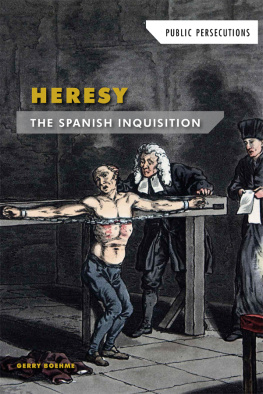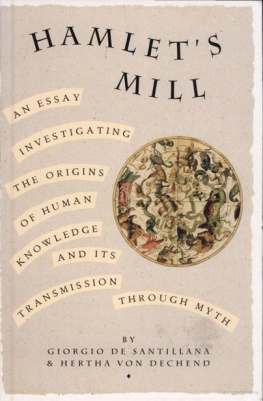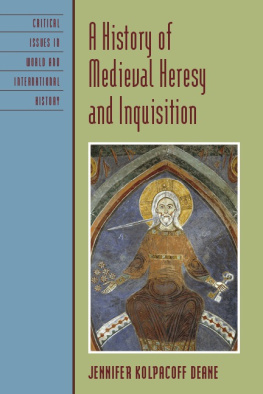
BEYOND THE INQUISITION
BEYOND THE INQUISITION
Ambrogio Catarino Politi and the Origins of the Counter-Reformation

GIORGIO CARAVALE
Translated by Don Weinstein
University of Notre Dame Press
Notre Dame, Indiana
English Language Edition Copyright 2017 University of Notre Dame
University of Notre Dame Press
Notre Dame, Indiana 46556
www.undpress.nd.edu
All Rights Reserved
Translated by Don Weinstein from Sulle tracce delleresia: Ambrogio Catarino Politi (14841553), by Giorgio Caravale, published by Leo S. Olschki, Florence. Copyright Leo S. Olschki, 2007.
Library of Congress Cataloging-in-Publication Data
Names: Caravale, Giorgio, author.
Title: Beyond the Inquisition : Ambrogio Catarino Politi and the origins of the Counter-Reformation / Giorgio Caravale ; translated by Don Weinstein.
Other titles: Sulle tracce delleresia. English
Description: Notre Dame : University of Notre Dame Press, 2017. | Includes bibliographical references and index.
Identifiers: LCCN 2016053421 (print) | LCCN 2017005367 (ebook) | ISBN 9780268100087 (hardcover : alk. paper) | ISBN 026810008X (hardcover : alk. paper) | ISBN 9780268100100 (pdf) | ISBN 9780268100117 (epub)
Subjects: LCSH: Ambrosius Catharinus, Archbishop of Conza, 1484-1553. | InquisitionItaly. | Christian heresiesItalyHistory. | Dissenters, ReligiousItalyHistory.
Classification: LCC BX4705.A56775 C3713 2017 (print) | LCC BX4705.A56775 (ebook) | DDC 282.092--dc23
LC record available at https://lccn.loc.gov/2016053421
ISBN 9780268100117
This paper meets the requirements of ANSI/NISO Z39.48-1992 (Permanence of Paper).
This e-Book was converted from the original source file by a third-party vendor. Readers who notice any formatting, textual, or readability issues are encouraged to contact the publisher at .
To Giovanni, because to look at the world with his eyes is to discover something new every day
CONTENTS


The protagonist of this book, the Sienese jurist Lancellotto Politi, better known as Ambrogio Catarino, figures most prominently in sixteenth-century Italian historiography as the author of Compendio derrori et inganni luterani (Compendium of Lutheran Errors and Deceptions), written in 1544 in reply to the best seller of the Reformation in Italy, the Beneficio di Cristo crocifisso (Venice, 1543). The Sienese Dominican was presented by Carlo Ginzburg and Adriano Prosperi as the antihero of their Giochi di pazienza (Un seminario sul Beneficio di Cristo, 1975), a fascinating and suggestive volume in which Politis Compendio was read as a litmus test to verify the accuracy of the hypothesis of the two editions of the Beneficio di Cristo. Politis name has appeared many times in studies dedicated to the diffusion of heretical doctrines on the Italian peninsula. He has for the most part, however, been connected to the image of heretic hunter, implacable adversary of Italian heterodoxy; and his writings have been read more to call attention to the doctrines and texts refuted by him than to comprehend his own thought.
The aim of my research has been to lift the veil that obscures Politi as a person, restoring him to the complexity of his biographical and intellectual journey. In some respects the outcome of my work has been surprising. From his entry into the Dominican order in 1517, after a sudden Savonarolan conversion that diverted him from an incipient career as a jurist and lawyer, Politi displayed an independence of judgment and freedom of thought unusual for a novice. His maturity and solid juridical formation reinforced in him a character both independent and headstrong, encouraging a path of doctrinal and theological learning free of the rigid precepts of the schools of theology. The strong Marian devotion inherited from his Sienese birth soon guided him to the reading of works extraneous to Dominican culture, such as those of Duns Scotus and William of Ockham, which Politi took in avidly along with the writings of Saint Thomas. The assignment to compose one of the first polemical responses to the Augustinian friar Martin Luther was given to him in 1520 while he was still intent on completing his theological studies. He finished them under the pressure of the controversy. The eclecticism of his thought and his polemical instinct led him more than once to bitter encounters with leading members of his order, among them Cardinal De Vio and the Master of the Sacred Palace Bartolomeo Spina. The clamorous accusations of heresy directed against him by Spina between 1542 and 1546, then repeated in the Council of Trent by his fellow Dominican Domingo de Soto during the controversy on the certitude of grace, not only testifies to the level of hostility that surrounded him but also offers a measure of Politi, a figure who could not be reduced to any one system, who did not adhere to any single one of the opposing theological schools (Thomist, Scotist, Dominican, Benedictine, Jesuit, etc.).
In the same years in which he began to distinguish himself as the most pugnacious anti-Lutheran polemicist, we find him absorbed in spiritual conversations with Vittoria Colonna and involved in intense epistolary exchanges with Jacopo Sadoleto. He was also a fervent admirer of Cardinal Gasparo Contarini, of whose doctrinal positions he became, at least for a time, a faithful advocate. Until the publication of Beneficio di Cristo announced the beginning of a phase of open proselytism and propaganda by the Viterbo group, Politi, despite his severe tone, left open a channel of dialogue and argument, convinced that it was both possible and necessary to find a meeting point even on those doctrinal questions that Luther had arbitrarily appropriated. And in the years that followed he never abandoned the hope of leading the most convinced dissenters back to orthodoxy. His aspirations and his attitude solidified in the course of his activity in the early 1540s in the noninquisitorial resolutions of numerous cases of heresy, activity Politi carried on with the collaboration of some members of the Company of Jesus, above all Alfonso Salmern. This strategy tended toward the art of persuasion rather than the use of weapons of repression in order to lead heretics back to Catholic orthodoxy. It deliberately offered an alternative to inquisitorial activity, moving beyond the inquisition. In addition, while the Beneficio was directly opposed by the Compendio, at the Council of Trent Politi shared his battles with personages such as the Benedictines Luciano degli Ottoni and Isidoro Cucchi da Chiari, colleagues of Benedetto da Mantova, author of the Beneficio. Readers will be able to judge for themselves whether these apparent contradictions are the fruit of an intellectual incoherence, a circumstantial opportunism, or instead, as I believe, a reflection of the variety and fluidity of doctrinal options that characterized the religious crisis of the 1540s and of the fragility of those historiographical interpretations that have used excessively schematic categories (e.g., the Intransigenti and the Spirituali) to study the furious encounters of those years on central themes of religious debate such as justification and the certitude of grace.
Certainly, Politi never hid his career ambitions and always succeeded in winning the sympathy and benevolence of the most influential personalities in the circles he chose to frequent, beginning with the popes he had the fortune to know. After all, his ecclesiology, centering on papal primacy, could only lead him in that direction. His choices and his comportment were, however, almost always guided by his innermost convictions, which he did not know how to forswear, even in the most delicate quandaries of his lifes course. In the single case in which he was constrained to rethink in critical terms a choice made in his youth, that of his Savonarolan loyalties, which engaged him in a long and tormented process of self-reflection, he found a solution only in the last years of his life. And only then, when the name of his old master Savonarola was paired with that of his bitterest enemy, Bernardo Ochino, did the circle of his existence seem at last to close.
Next page










